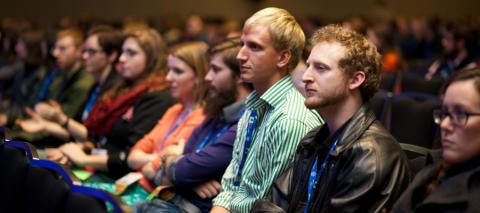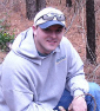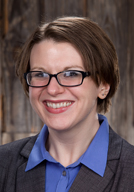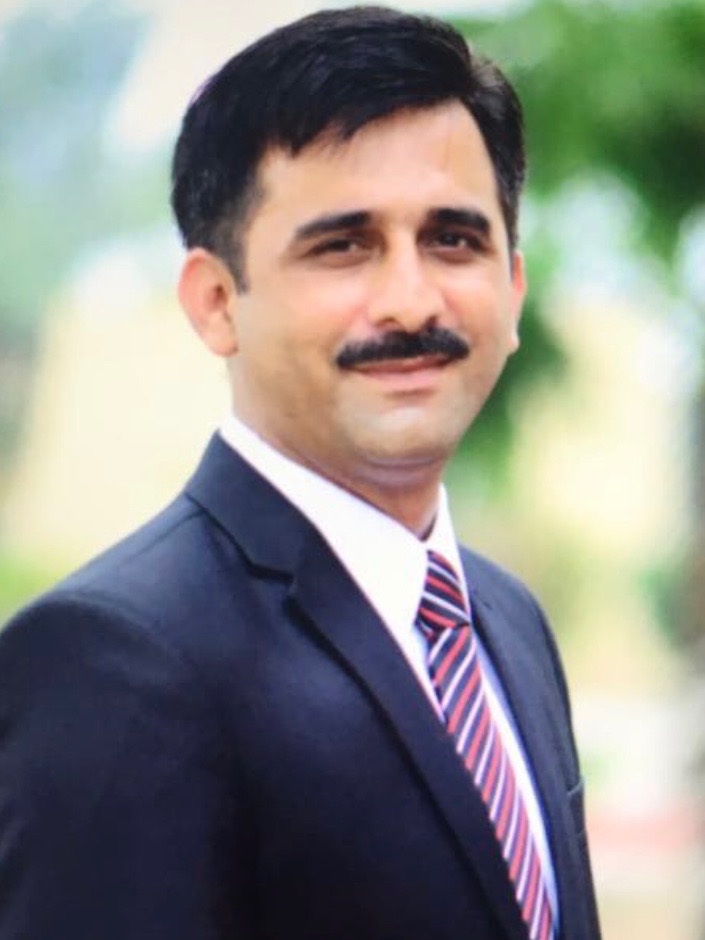
ESA has an active and engaged early career membership. Learn about committee activities and important programs and services, and meet our spotlighted members below.
ESA Early Career Professionals Newsletters
ESA’s Early Career Professionals Committee (formerly Student Transition & Early Professionals (STEP) Committee) publishes newsletters that provide updates, details on symposia and professional development webinars, upcoming deadlines and other relevant information. Meet the members of this Committee and view past newsletters below. View the newsletter archives.
Current Issue - October 17, 2019
Early Career Professionals SPOTLIGHTS
Learn how early career professional members are involved in research, teaching, outreach or extension are enjoying their work in insect science. ESA early career professional members can submit their spotlight here.
 Dr. Travis Prochaska, 2016 Chair, ESA ECP Committee, talks about the value of ESA membership in his article, "Flying High: What's Your Value?"
Dr. Travis Prochaska, 2016 Chair, ESA ECP Committee, talks about the value of ESA membership in his article, "Flying High: What's Your Value?"
As students graduate and develop into Student Transition and Early Professional memberships, we have all thought about one thing – Membership dues. Can I afford them without the assistance I once had from my graduate adviser? Does the ESA membership really benefit me? As a recent graduate, finally shifting into a new job, I can honestly say I’m finally uncovering these answers for myself.... more
 Name: Dr. Lily Calderwood
Name: Dr. Lily Calderwood
Job Title: Commercial Horticulture Sr. Resource Educator
Employer: Cornell Cooperative Extension
ESA Branch: Eastern Branch; ESA Section: P-IE
How did you become interested in Entomology? I grew up next to a commercial apple orchard where clouds of pesticides blew into our backyard.
What is your current research focus? 1. IPM for hop production in the northeast 2. High tunnel and greenhouse biocontrol.
What are your career goals? Agricultural Entomologist for Extension in the northeast region.
Describe how ESA has broadened your horizons: ESA has helped me make valuable in-person connections and the early career webinars have been very helpful.
Describe a favorite experience while attending an ESA meeting: Dr. Bill Lamp (UMD) graciously brought part of his potato leafhopper colony to an EB meeting for me to start my own colony!
 Name: Dr. David R. Coyle
Name: Dr. David R. Coyle
Job Title: Extension Associate - Forest Health
Employer: Southern Regional Extension Forestry, University of Georgia, Warnell School of Forestry
ESA Branch: Southeastern Branch; ESA Section: Plant-Insect Ecosystems
How did you become interested in Entomology? I became interested in Entomology when I was a kid. Growing up in rural Minnesota, I was surrounded by nature. My parents encouraged my curiosity, and put up with countless jars of caterpillars in the porch, insects in the freezer, and the annual collection for the county fair. It’s funny – in 2nd grade we had to keep a journal, and at one point write down what we wanted to be when we grew up. I wrote “entomologist”. Ma still has that piece of paper…
What is your current research focus? I currently run a forest health and invasive species program for the 13-state southeastern U.S. region. I work primarily with state and county-level foresters and extension agents to ensure they have the most current knowledge pertaining to insects, fungi, and plants that impact forests in the Southeast. I educate using classic techniques (e.g. fact sheets), newer technologies (e.g. webinars), and in-person workshops.
What are your career goals? My career goal is to elevate this program to become the go-to source for forest health information for professionals in the southeastern region. Eventually, I’d like to see this program take on a national/continental role, and expand to include more education for the general public as well.
Describe how ESA has broadened your horizons. ESA has been great for me both personally and professionally. Personally, I’ve met so many people and made such great friends. Attending ESA meetings has allowed me to see places I likely would have never visited. And, it’s given me the chance to learn about things I normally wouldn’t have a lot of exposure to (e.g. Zika…because when people find out you’re an entomologist, they assume you know everything about the latest big insect-related issue). Professionally, the contacts I’ve made over the course of my ESA membership are absolutely invaluable. Running a regional program depends, in part, on collaboration with other scientists. There’s a lot of expertise needed, and one person can’t possibly have all of it – that’s where the relationships with others are so important.
Describe a favorite experience while attending an ESA meeting. There’s no one favorite experience from an ESA meeting – to me, the meetings are about seeing old friends, meeting new people, and learning the latest and greatest entomology knowledge we have to offer – especially regarding insect management.
 Name: Dr. Katelyn Kesheimer
Name: Dr. Katelyn Kesheimer
Job Title: IPM-Agent, Lubbock/Crosby
Employer: Texas A&M Agrilife Extension
ESA Branch: Southwestern Branch; ESA Section: Plant-Insect Ecosystems
How did you become interested in Entomology? I have always been interested in the sciences, especially Biology, but never even considered Entomology until I was an undergraduate at the University of Kentucky. I randomly stumbled upon a general Entomology class where I became fascinated by insects and the various ways they impact our daily lives. I knew that this was something I wanted to continue to learn about for as long as I could.
What is your current research focus? I work on integrated pest management for crops grown on the southern High Plains of Texas. The main crops grown here are cotton, corn, and sorghum, all under limited water conditions. Some of my current work is investigating a relatively new pest to sorghum in the area, the sugarcane aphid, and understanding its population dynamics.
What are your career goals? I want to be in a position that combines extension and research, allowing me to work closely with producers and providing them with the most profitable and sustainable options for growing their crops.
Describe how ESA has broadened your horizons: ESA has been a wonderful way to meet new people in similar, or even completely different, areas of research. I have found the entomological community to be generous with their time and knowledge, which has led to successful collaborations and research ideas. I always come back from an ESA meeting with a fresh outlook on my work and renewed motivation.
Describe a favorite experience while attending an ESA meeting: Now that my former classmates and co-workers have moved on to new positions, my favorite part of the meetings is catching up with them.
.jpg) Name: Sarah Lawson
Name: Sarah Lawson
Job Title: Postdoctoral researcher
ESA Branch: Eastern Branch; ESA Section: SysEB
How did you become interested in Entomology? As an undergraduate at the UNM, I took an amazing class with Dr. Kelly Miller. I was fascinated by the diversity and adaptations of insects.
What is your current research focus? I am interested in the evolution of social behavior. I want to understand how groups are formed and persist and why social groups are so successful.
What are your career goals? I plan to stay in academia. I want to find a position that allows me to teach and pursue my research interest in social insects.
Describe how ESA has broadened your horizons: During ESA, I like to attend seminars outside my research field. This gives me new ideas and allows me to learn more about the amazing diversity.
Describe a favorite experience while attending an ESA meeting: I really enjoy the opening receptions. It is a great time to reconnect with old friends, meet new people and once ESA had insects to snack on!
 Dr. Rob Morrison
Dr. Rob Morrison
Name: Dr. Rob Morrison
Job Title: Research Entomologist
Employer: USDA-ARS Center for Grain and Animal Health Research
ESA Branch: North Central Branch; ESA Section: PI-E
How did you become interested in Entomology? Since I was a young kid, I've been fascinated by the living, natural world. I knew I wanted to be some sort of biologist after taking biology in high school, because the course was so amazing. As an undergraduate at a liberal arts school, I performed research with the one faculty member dedicated to entomology. That opened the world of insects up to me, and I realized how fascinating and vitally important insects are.
What is your current research focus? I am currently researching behaviorally-based management strategies for controlling stored product pests, including attract-and-kill at the USDA-ARS Center for Grain and Animal Health Research in Manhattan, Kansas. My long-term research interests include understanding how semiochemicals modify plant product-insect interactions, and how we can exploit this knowledge to improve the sustainability of agriculture.
What are your career goals? Ultimately, my goal is to be a faculty member at a large land grant university performing research that is of paramount importance to growers and other stakeholders, while increasing the sustainability of agriculture.
Describe how ESA has broadened your horizons. ESA has been enormously beneficial to my career by providing venues to present my research, opportunities for networking and professional development, as well as help mentoring the next generation of entomologists. ESA's annual meeting, committee work, opportunities to provide younger students feedback on their work, and branch meetings have all been instrumental in helping me to get to where I am today.

Name: Dr. Rebecca Schmidt-Jeffris
Job title: Postdoctoral Research Associate
Employer: Cornell University
ESA Branch: Pacific Branch and Eastern Branch; ESA Section: Plant-Insect Ecosystems
How did you become interested in Entomology? I have always been interested in animal ecology and ethology. In childhood, I went through phases of wanting to study whales, bats, hermit crabs, ants, and reptiles in turn. As an undergraduate at Washburn University, I had the opportunity to conduct my own research projects. My research advisor, Lee Boyd, encouraged me to work with insects to investigate my interest in prey preferences and kinship selection. My first study organism was the Chinese praying mantis – and I was permanently hooked!
What is your current research focus? I am interested in how landscape use and management practices affect arthropod communities in agroecosystems. I work with Brian Nault in the vegetable entomology lab at Cornell. I am currently investigating how temporal and spatial dominance of Bt-free corn affect European corn borer (ECB) and natural enemy populations. Additional work involves examining how soil management affects plant health and host plant preferences of ECB. We are also concluding research examining efficacy of newer, reduced-risk materials for ECB control in snap bean.
What are your career goals? I am currently seeking a position as a professor or USDA-ARS scientist working on applied arthropod ecology research. Beyond being able to investigate my own research questions, I am excited about the opportunity that these positions bring to mentor new scientists.
Describe how ESA has broadened your horizons. ESA has been an amazing means for meeting new people within the entomological community. I am especially grateful that I have gotten to know both established professionals in ESA leadership, as well as up and coming leaders during my time on the Student Affairs Committee and currently in the Early Career Professionals Committee. Interactions with these people have strengthened my confidence in my own abilities as a scientist and leader, and I am constantly impressed by how welcoming we are as a society. ESA meetings have allowed me to travel the country in addition to meeting people from all over the world.
Describe a favorite experience while attending an ESA meeting. I really enjoyed the latest Pacific Branch meeting (April 2016). First, it was in Honolulu, so it was nice to take a break from the east coast winter, and to go swimming with sea turtles and spot whales. Additionally, I was able to present my research from my Ph.D. during the opening plenary, which was an honor and a great opportunity. I am looking forward to ICE, which is likely to be my favorite meeting yet.
 Name: Dr. Kaitlin Stack Whitney
Name: Dr. Kaitlin Stack Whitney
Job Title: Visiting Researcher
Employer: Rochester Institute of Technology
ESA Branch: Eastern Branch; ESA Section: Plant-Insect Ecosystems
How did you become interested in Entomology? Working in Dr. Alison Power's lab in undergrad at Cornell University - a student hourly position became independent research then honors thesis.
What is your current research focus? Plant community impacts on pollinator conservation in roadsides in New York.
What are your career goals? To teach at an undergraduate-focused institution; to continue my work supporting diversity and disability access in STEM.
Describe how ESA has broadened your horizons: I've met such interesting (and NICE) people who are so passionate about insects - and I learn so much from them.
Describe a favorite experience while attending an ESA meeting: Hearing my former grad school labmates present on their new work – it’s exciting to see what my colleagues work on as early career professionals!
 Name: Dr. Muhammad Irfan Ullah
Name: Dr. Muhammad Irfan Ullah
Job Title: Assistant Professor
ESA Branch: International Branch; ESA Section: P-IE
How did you become interested in Entomology? I love working with insects because they are close to nature.
What is your current research focus? Insect Plant interaction.
What are your career goals? I love to explore citrus insect pests, a major crop in my area.
Describe how ESA has broadened your horizons. ESA has provided me many diverse experiences ranging from networking, exploring and sharing research with peers and ultimately having useful feedback.
Describe a favorite experience while attending an ESA meeting. The working as volunteer in ESA meeting is my favorite experience.
